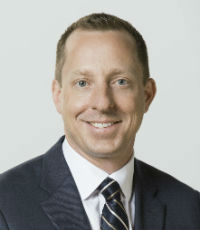Blaine Lennox of Jarislowsky Fraser is part of Wealth Professional Canada's Portfolio Management Powerhouses 2017

Partner and portfolio manager, institutional and private clients
JARISLOWSKY FRASER
Years in the industry: 22
Years as a PM: 19
Industry accreditations: CFA, CSC, Canadian Options Course
Typical clients: Affluent families and individuals, private and public foundations, universities, family offices
Using a discretionary portfolio manager is only a consideration for a certain segment of the population. Protecting wealth only becomes an issue when you have it, and when you do, expectations tend to be high, explains Blaine Lennox of Jarislowsky Fraser.
“Generally speaking, we are a good fit for individuals and organizations that are interested in a conservative, high-quality investment approach that is designed to protect capital while generating income and providing real long-term growth,” he says. “The desire to limit losses in down markets, optimize tax efficiency and ensure their portfolios produce an adequate income are the items that are top of mind for our clients currently.”
It’s a lot to take on board, but Lennox has been able to narrow down what being a successful discretionary PM ultimately means. “My clients’ needs and goals remain essentially the same – to preserve their wealth so they can sleep at night, ensure their income needs are met and grow their wealth in the long term,” he says.
That description holds true no matter the client, but parts of the job do evolve, such as the type of investments a PM can use. In that respect, choice has never been greater. “Investment portfolios have become much more diversified internationally,” Lennox says, “and there is increased interest in solutions that integrate environmental, social and governance [ESG] considerations.”
Looking at the current lay of the land, Lennox believes predictions of a downturn are slightly premature, but he warns that isn’t a call to arms to go on an equity spending spree, as valuations in the markets give him cause for concern. “Our more cautious view is due to the elevated valuations for equities, the unwinding of the extraordinary monetary policy accommodation and rising populist sentiment, all of which contribute to general uncertainty that can cause greater volatility,” he says.
JARISLOWSKY FRASER
Years in the industry: 22
Years as a PM: 19
Industry accreditations: CFA, CSC, Canadian Options Course
Typical clients: Affluent families and individuals, private and public foundations, universities, family offices
Using a discretionary portfolio manager is only a consideration for a certain segment of the population. Protecting wealth only becomes an issue when you have it, and when you do, expectations tend to be high, explains Blaine Lennox of Jarislowsky Fraser.
“Generally speaking, we are a good fit for individuals and organizations that are interested in a conservative, high-quality investment approach that is designed to protect capital while generating income and providing real long-term growth,” he says. “The desire to limit losses in down markets, optimize tax efficiency and ensure their portfolios produce an adequate income are the items that are top of mind for our clients currently.”
It’s a lot to take on board, but Lennox has been able to narrow down what being a successful discretionary PM ultimately means. “My clients’ needs and goals remain essentially the same – to preserve their wealth so they can sleep at night, ensure their income needs are met and grow their wealth in the long term,” he says.
That description holds true no matter the client, but parts of the job do evolve, such as the type of investments a PM can use. In that respect, choice has never been greater. “Investment portfolios have become much more diversified internationally,” Lennox says, “and there is increased interest in solutions that integrate environmental, social and governance [ESG] considerations.”
Looking at the current lay of the land, Lennox believes predictions of a downturn are slightly premature, but he warns that isn’t a call to arms to go on an equity spending spree, as valuations in the markets give him cause for concern. “Our more cautious view is due to the elevated valuations for equities, the unwinding of the extraordinary monetary policy accommodation and rising populist sentiment, all of which contribute to general uncertainty that can cause greater volatility,” he says.



